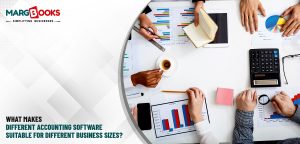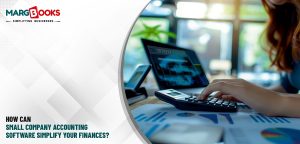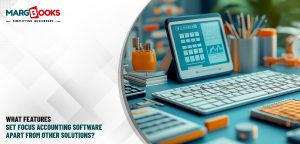Running a small business means juggling countless responsibilities, but managing your finances shouldn’t feel like solving a complex puzzle. Choosing the right Accounting Application Software can transform your bookkeeping from a dreaded chore into a streamlined process that helps your business grow.
Whether you’re a freelancer tracking expenses or a growing company managing multiple revenue streams, the perfect accounting solution is out there waiting for you. The key is knowing what to look for and how to match software features with your specific business needs.
Why Every Small Business Needs Quality Accounting Application Software?
Think of accounting software as the financial heartbeat of your business. Just like you wouldn’t drive a car without a dashboard, you shouldn’t run a business without proper financial visibility. The right software doesn’t just track numbers, it provides insights that help you make smarter decisions.
Small business owners often start with spreadsheets or basic bookkeeping methods, but as their business grows, these manual approaches become time-consuming and error-prone. Quality software automates repetitive tasks, reduces human error, and gives you real-time financial insights that can make or break important business decisions.
Essential Features to Look for in Your Accounting Solution
When evaluating different platforms, focus on features that directly impact your daily operations:
- Automated invoicing and payment processing – Save hours each week by automating your billing cycle.
- Bank reconciliation capabilities – Sync your accounts automatically to catch discrepancies quickly.
- Tax preparation tools – Generate reports that make tax season less stressful
- Multi-user access – Allow your team or accountant to collaborate seamlessly.
- Mobile accessibility – Manage finances on the go from any device.
- Customizable reporting – Create reports that matter most to your business decisions.
Many business owners also benefit from integrated solutions. For instance, if you sell products, look for software that includes Inventory management software capabilities. This integration eliminates double data entry and provides a complete picture of your business operations.
Understanding Your Business’s Unique Requirements
Before diving into accounting application software comparisons, take a step back and assess your specific needs. A consulting business has different requirements than a retail store or restaurant. Ask yourself these questions:
What’s your monthly transaction volume? A freelancer with 20 transactions monthly needs different capabilities than a retailer processing hundreds of sales daily. Consider your growth trajectory, too, and choose software that can scale with your ambitions.
Do you need industry-specific features? Some businesses require specialized functionality, including project tracking, time billing, or compliance reporting. Platforms such as MargBooks often cater to specific industries, offering tailored solutions that generic software might miss.
How tech-savvy is your team? There’s no point in choosing feature-rich software if it’s too complex for daily use. Sometimes, simpler solutions with intuitive interfaces deliver better results than powerful but complicated platforms.
Budgeting for Your Accounting Application Software Investment
Accounting software pricing varies dramatically, from free basic plans to enterprise solutions costing hundreds monthly. However, don’t let price be your only deciding factor; consider the total cost of ownership.
Free software might seem attractive, but it often comes with limitations that could cost more in the long run. You might hit transaction limits, lack customer support, or miss crucial features that require expensive upgrades.
Mid-range solutions typically offer the best value for growing businesses. These platforms, including options, MargBooks, usually provide comprehensive features without enterprise-level complexity or costs.
Consider implementation costs too. Some software requires extensive setup, training, or data migration that adds to your total investment. Factor in the time you’ll spend learning the system and training your team.
Integration Capabilities That Matter
Your online billing software shouldn’t exist in isolation. The best solutions integrate seamlessly with other business tools you’re already using. Look for platforms that connect with:
- Your bank accounts and credit cards for automatic transaction imports
- This is for streamlined invoice management
- E-commerce platforms, if you sell online
- Payroll systems for comprehensive employee management
- CRM software to track customer interactions and sales data
These integrations eliminate manual data entry, reduce errors, and provide comprehensive business insights. When evaluating MargBooks or other platforms, prioritize those offering robust integration ecosystems.
Security and Compliance Considerations
Financial data is sensitive, making security non-negotiable. Ensure any software you consider offers:
- Bank-level encryption for data protection
- Regular security audits and updates
- Two-factor authentication options
- Automated backups and disaster recovery
- Compliance with relevant industry standards
Don’t overlook compliance requirements specific to your industry or location. Some businesses need audit trails, specific reporting formats, or data retention policies that not all accounting application software supports.
Making Your Final Decision
Once you’ve narrowed down your options, take advantage of free trials. Most reputable platforms, including MargBooks, offer trial periods that let you test functionality with real business data. Use this time to:
- Import sample transactions and test workflow efficiency
- Generate reports you’ll use in decision-making
- Test customer support responsiveness and quality
- Evaluate mobile app functionality if you need on-the-go access
Ask for references from businesses similar to yours. Real user experiences often reveal pros and cons that marketing materials don’t mention.
Conclusion
Selecting the right Accounting Application Software is one of the most important technology decisions you’ll make for your business. The perfect solution streamlines your financial management, provides valuable insights, and grows with your company. Remember that the best software isn’t necessarily the most expensive or feature-rich. It’s the one that fits your specific needs, budget, and workflow.
Take time to evaluate your requirements, test different options, and choose a platform that will support your business goals for years to come. With the right software in place, you’ll spend less time on bookkeeping and more time building the business you love.




